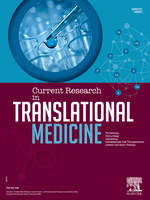
Current Research in Translational Medicine
Scope & Guideline
Advancing Medical Frontiers Through Innovative Research
Introduction
Aims and Scopes
- Hematological Malignancies:
The journal consistently publishes research related to hematological cancers, including acute myeloid leukemia, lymphoma, and multiple myeloma, focusing on novel treatments and therapeutic strategies. - Translational Research:
A core aim is to translate laboratory findings into clinical applications, emphasizing studies that bridge experimental and clinical medicine. - Cell and Gene Therapy:
Research on cell-based therapies, particularly CAR-T cell therapy and stem cell transplantation, is a significant focus, highlighting advancements in treatment methodologies. - Immunotherapy:
The journal covers emerging immunotherapeutic strategies, investigating their efficacy and safety in treating various malignancies. - Biomarkers and Diagnostics:
There is a strong emphasis on identifying biomarkers for disease prognosis and treatment response, contributing to personalized medicine. - Regenerative Medicine:
Research involving stem cells and regenerative therapies is prevalent, showcasing innovative approaches to repair and regenerate damaged tissues. - Clinical Guidelines and Best Practices:
The journal also addresses clinical practices through guidelines and recommendations for managing hematological disorders.
Trending and Emerging
- CAR-T Cell and Novel Immunotherapies:
The increasing focus on CAR-T cell therapy and other immunotherapeutic approaches highlights the journal's commitment to cutting-edge treatments and their applications in hematological malignancies. - Next-Generation Sequencing and Genomics:
There is a growing trend towards incorporating genomic technologies such as next-generation sequencing, which aids in understanding the genetic underpinnings of diseases and personalizing treatment. - Biomarker Discovery and Application:
Research aimed at discovering and validating biomarkers for various hematological conditions is on the rise, enhancing the capabilities of precision medicine. - Artificial Intelligence and Data Analytics:
The integration of AI and data analytics in predicting treatment outcomes and patient responses is emerging as a significant trend, reflecting the journal's adaptation to technological advancements. - Regenerative and Stem Cell Therapies:
An increasing number of studies are exploring the potential of regenerative medicine and stem cell therapies, indicating a shift towards innovative approaches in treatment. - Clinical Guidelines and Evidence-Based Practices:
There is a noticeable trend towards publishing clinical guidelines and recommendations, aiming to standardize practices and improve patient care in hematological oncology.
Declining or Waning
- Solid Tumor Research:
Research specifically focused on solid tumors has decreased, indicating a shift towards hematological malignancies and therapies related to blood cancers. - Traditional Pharmacotherapy:
There appears to be a reduction in studies centered on conventional pharmacological treatments, as innovative therapies like immunotherapy and gene therapy become more prominent. - Infectious Disease Research:
While COVID-19 research was significant during the pandemic, the volume of papers addressing infectious diseases outside the context of hematological malignancies has lessened. - Basic Science Studies:
There is a noticeable decline in purely basic science research that does not directly translate to clinical applications, as the journal increasingly emphasizes translational studies.
Similar Journals
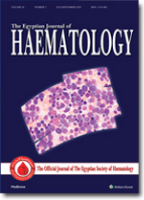
Egyptian Journal of Haematology
Connecting Scholars to Transform Hematology PracticeThe Egyptian Journal of Haematology, published by WOLTERS KLUWER MEDKNOW PUBLICATIONS, stands as a pivotal resource in the field of hematology, particularly within the context of Egypt and the broader Middle Eastern region. This journal is dedicated to disseminating high-quality research that explores the latest advancements in blood disorders, hematologic malignancies, and transfusion medicine. With a focus on original research, case studies, and reviews, it aims to provide a comprehensive platform for hematologists, researchers, and healthcare professionals to enhance their understanding and management of hematological conditions. Although it is not an open-access journal, the rigorous peer-review process ensures that only the most impactful studies are published, contributing to the journal's reputation in the academic community. The Egyptian Journal of Haematology serves as an essential tool for advancing knowledge, improving clinical outcomes, and fostering collaboration among experts in the field.

npj Regenerative Medicine
Shaping the Future of Therapeutic Advancements.npj Regenerative Medicine, published by NATURE PORTFOLIO, is at the forefront of research and innovation in the field of regenerative medicine, fostering a deep understanding of cellular and molecular processes that can be leveraged for therapeutic advancements. Launched as an Open Access journal since 2016, it ensures wide dissemination of knowledge, allowing researchers, professionals, and students to access high-quality articles without barriers. With an impressive impact, it holds Q1 ratings across multiple categories including Biomedical Engineering, Cell Biology, Developmental Biology, and Medicine (miscellaneous) as of 2023, indicating its critical role in shaping contemporary scientific discourse. The journal ranks notably within the top 10% in multiple Scopus categories, indicating its commitment to publishing pioneering research that addresses pressing challenges in regenerative therapies. Addressing the dynamic convergence of disciplines, npj Regenerative Medicine is poised to not only impact academic thought but also translate into clinical applications, making it a pivotal resource for those invested in the future of medicine.
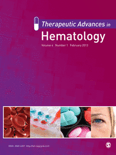
Therapeutic Advances in Hematology
Fostering collaboration for a healthier tomorrow.Therapeutic Advances in Hematology is a prestigious, peer-reviewed journal dedicated to advancing the field of hematology through innovative research and clinical studies. Published by SAGE Publications Ltd, this journal has become a vital resource for hematology professionals and researchers since its inception in 2010. With its impactful Q1 ranking in Hematology and a Scopus rank of 62 out of 137, it firmly establishes itself as a leader in disseminating significant findings and therapeutic approaches. The journal has been committed to open access since 2019, ensuring that its cutting-edge research is readily available to the global scientific community. Covering a broad scope of topics within hematology, Therapeutic Advances in Hematology is an essential platform for those seeking to enhance their understanding and implementation of therapeutic practices in hematological conditions. The journal embraces submissions from both clinical and laboratory perspectives, fostering collaboration and dialogue among researchers, clinicians, and students alike.
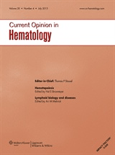
CURRENT OPINION IN HEMATOLOGY
Empowering clinicians and researchers with cutting-edge insights.CURRENT OPINION IN HEMATOLOGY is a leading peer-reviewed journal published by Lippincott Williams & Wilkins, focusing on the latest advancements and insights in the field of hematology. With an impressive impact factor and ranked in the first quartile (Q1) of its category, this journal serves as a vital resource for researchers, clinicians, and students seeking to stay informed on contemporary issues and emerging trends in hematological research and treatment. Established in 1994, it showcases critical reviews, expert commentary, and systematic analyses across a broad spectrum of hematology topics, contributing significantly to clinical and experimental knowledge through its robust editorial standards. While offering traditional subscription access, CURRENT OPINION IN HEMATOLOGY remains committed to providing a platform that bridges the gap between fundamental research and clinical application, making it indispensable for professionals dedicated to advancing patient care and scientific understanding in hematology.
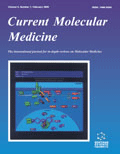
CURRENT MOLECULAR MEDICINE
Advancing the Frontiers of Molecular MedicineCURRENT MOLECULAR MEDICINE is a pivotal journal fostering advancements in the interdisciplinary fields of molecular medicine, biochemistry, and genetics. Published by Bentham Science Publishers, this esteemed journal has been disseminating vital research findings since its inception in 2001 and is continuously dedicated to exploring the molecular basis of health and disease. With a focus on translational research, CURRENT MOLECULAR MEDICINE provides an invaluable platform for researchers, healthcare professionals, and students, making significant contributions to the understanding of molecular mechanisms and therapeutic strategies. With an ISSN of 1566-5240 and an E-ISSN of 1875-5666, the journal holds a commendable position within the scientific community, being ranked Q3 in Biochemistry and Molecular Biology and Q2 in Medicine (miscellaneous) as of 2023. This journal does not currently operate on an open access model but remains accessible through various institutional subscriptions. The multidisciplinary scope covering molecular biology to medicinal applications positions CURRENT MOLECULAR MEDICINE as an essential resource for those striving to meet the challenges of modern healthcare and biomedical research.
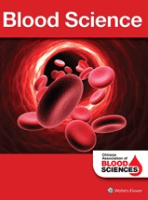
Blood Science
Pioneering Research for Better Blood HealthBlood Science is a distinguished peer-reviewed journal published by Lippincott Williams & Wilkins, focusing on the dynamic field of hematology. Since its inception, the journal has aimed to disseminate high-quality research and innovative findings that contribute to our understanding of blood-related health issues. With the ISSN 2543-6368, it offers a platform for academic discussions and breakthroughs in various subfields including hematopathology, blood disorders, and transfusion medicine. As of 2023, Blood Science is ranked in the third quartile (Q3) within the hematology category, indicating a burgeoning influence among its peers, with a Scopus rank of #101 out of 137 journals, placing it in the 26th percentile. Although it is not an open-access journal, it provides essential insights and valuable data for researchers, healthcare professionals, and students alike, enhancing the collective knowledge and practices in hematology. With a publication period spanning from 2019 to 2024, Blood Science remains committed to fostering the advancement of blood science research and enhancing patient care methodologies.

Current Medical Science
Empowering Researchers with Open Access KnowledgeCurrent Medical Science is a prominent academic journal dedicated to advancing knowledge in the fields of Medicine, Biochemistry, and Genetics. Published by SPRINGER with an ISSN of 2096-5230 and E-ISSN 2523-899X, this journal is based in China and serves as a vital resource for researchers, professionals, and students alike. With a focus on innovative research and emerging trends, Current Medical Science has established itself with an impactful presence, operating under Open Access guidelines to ensure wide dissemination of scientific findings. The journal's recognition is underscored by its impressive Scopus rankings, including a Q3 quartile placement in Biochemistry and Genetics as of 2023. It is noteworthy that the journal spans converged years from 2018 to 2024, providing a comprehensive platform for scholarly discussions and developments that drive the evolution of medical science. As it continues to publish influential research, Current Medical Science plays an essential role in bridging the gap between laboratory science and clinical application.
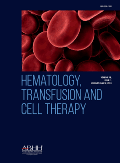
Hematology Transfusion and Cell Therapy
Advancing knowledge in hematology and cell therapy.Hematology Transfusion and Cell Therapy, published by Elsevier, is a leading Open Access journal dedicated to advancing the fields of hematology, immunology, and transfusion medicine. Since its establishment in 2018, this journal has provided a vital platform for sharing innovative research and clinical advancements in the management of blood disorders and cellular therapies. Based in Brazil, it attracts a global audience, facilitating access to high-quality research that influences clinical practice and policy. With a current impact factor that places it in the Q3 category for both hematology and immunology as of 2023, the journal is recognized for its rigorous peer-review process and commitment to disseminating significant findings. By featuring a diverse range of articles, from original research to reviews, Hematology Transfusion and Cell Therapy aims to foster collaboration and knowledge sharing among researchers, professionals, and students alike, empowering them to tackle emerging challenges in their fields.

Hematologie
Exploring Innovations in HematologyHematologie is a highly regarded journal in the field of hematology, published by JOHN LIBBEY EUROTEXT LTD. With an ISSN of 1264-7527 and an E-ISSN of 1950-6368, this journal has established itself as a vital resource for researchers, clinicians, and students dedicated to advancing the understanding of blood disorders and treatments. Although the journal's coverage in Scopus was discontinued in 2018, it has continually provided invaluable insights and research findings. The journal aims to foster knowledge sharing and discussion in hematology, exploring innovative methodologies and emerging trends in the field. With a commitment to quality research, Hematologie remains an essential platform for disseminating critical findings that can drive clinical practice and influence future studies in hematological sciences.

Journal of Hematology & Oncology
Elevating Knowledge in Cancer and Hematological StudiesJournal of Hematology & Oncology, published by BMC, is a leading open-access journal dedicated to the dynamic fields of hematology and oncology, with a continuous publication record since 2008. Based in the United Kingdom, this prestigious journal provides a platform for groundbreaking research, encompassing topics that span cancer research, hematological disorders, and molecular biology. With a remarkable Q1 ranking in multiple categories including Cancer Research, Hematology, Molecular Biology, and Oncology for 2023, it stands as a significant contributor to the scientific community. The journal's rigorous peer-review process ensures the dissemination of high-quality studies that drive advancements in these critical areas of medicine, boasting an impressive Scopus rank in the top echelons of its fields. As an open-access publication, it promotes widespread accessibility and sharing of knowledge, making it an indispensable resource for researchers, clinicians, and students striving to make advancements in understanding and treating hematological and oncological diseases.